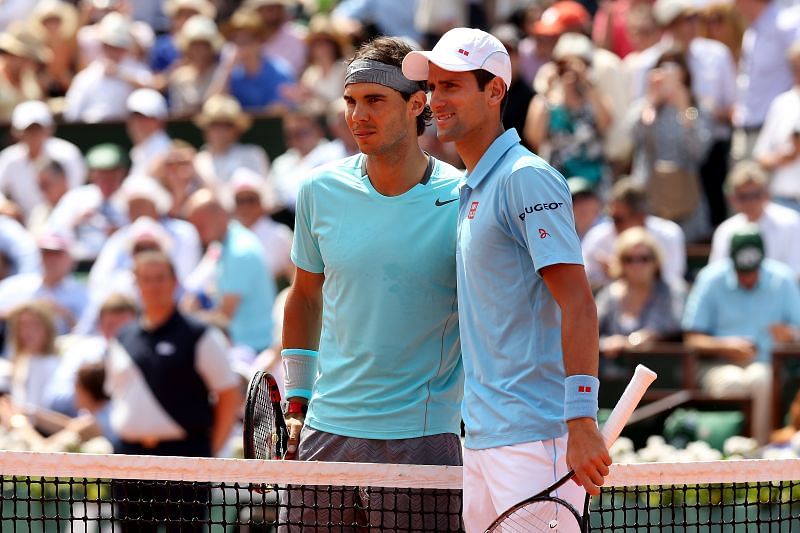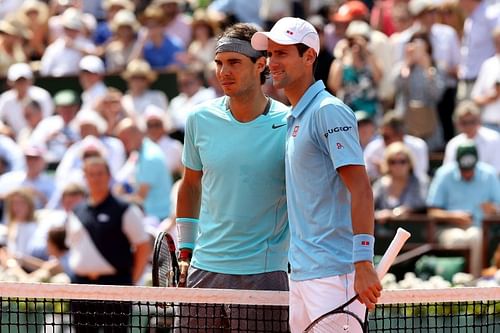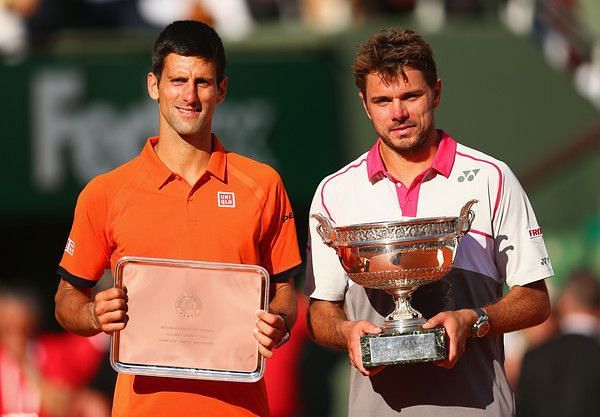
Coach Vajda explains how Novak Djokovic changed his game to beat Nadal at RG

For three straight years, Novak Djokovic was thwarted in his attempt at completing the Career Grand Slam at Roland Garros. And the man doing the thwarting was always the same - Rafael Nadal.
So when Djokovic finally beat the Spaniard in the 2015 quarterfinals, he and the rest of the world fully expected him to go all the way and finally grab that elusive trophy. But Stan Wawrinka had other ideas in the final.
In the newest episode of The Tennis Podcast, Novak Djokovic's coach Marian Vajda told David Law, Catherine Whitaker and Matt Roberts that the Serb had changed his claycourt game to finally get the better of Nadal in the 2015 quarterfinals. Vajda also said that his ward was, understandably, very bitter and distraught after being denied by Wawrinka at the last hurdle.
"Maybe he counted the Stan match as potentially the one to have the trophy in his hands. He was quite bitter to lose the final," Vajda said.
By beating nine-time champion Rafael Nadal in the quarterfinals, Djokovic became the first (and so far only) player to beat Roland Garros' most decorated champion without dropping a set. He also beat Andy Murray in impressive fashion in the semis, and had looked determined to finally fill the only hole in his CV.
But after doing all the hard work, Novak Djokovic stumbled in the face of what many believed was a lesser challenge - the final against Stan Wawrinka.
"It was an amazing situation in 2015, he beat Rafael in the quarterfinals and Murray in the semis to reach the final but lost to Stan," said Vajda.
2015 was a banner season for Novak Djokovic, as he came into Roland Garros on a 28-match winning streak. The Serb was an overwhelming favourite against the 2014 Australian Open champion, and he looked on course for a routine win when he took the opening set.
But 'Stan the man' had himself achieved a breakthrough in the tournament, beating his compatriot Roger Federer for the first time at a Slam. Playing with the confidence of a player just freed from his shackles, Wawrinka raised his level mid-way through the final.
Novak Djokovic looked rattled by the onslaught of ferocious groundstrokes coming off both from Wawrinka, and struggled to conjure a response. Wawrinka eventually closed out a four-set win.
"Right after the final he felt very disappointed," Vajda said. "Maybe you have only chance, you may not have it again."
The unexpected loss reduced Novak Djokovic's finals record at the claycourt Major to 0-3. As it turned out, that would be one of just six defeats suffered by Djokovic in 88 matches that season, where he racked up three Grand Slam titles, a record six Masters 1000 titles and a fourth-straight ATP Finals.
In that context, Wawrinka's win over Novak Djokovic in the 2005 Roland Garros final was an 'upset' of epic proportions.
All of Novak Djokovic's focus was on beating Nadal at Roland Garros: Vajda

Marian Vajda recalled that before his string of losses to Rafael Nadal, clay was actually the favorite surface of Novak Djokovic.
"Basically his favorite surface was clay. Ironically when he became professional, he won tournaments on clay. Later on he adapted to other surfaces, winning Grand Slams on grass and hardcourt," Vajda said.
After six losses to Rafael Nadal at Roland Garros, Novak Djokovic was determined to avoid making it seven in a row. And he broke the jinx in some style.
Rafael Nadal, for the first time in his career, failed to win a set in a Roland Garros match as Novak Djokovic emulated Robin Soderling to become only the second player to beat the Spaniard on the Parisian terre battue.
Speaking about Novak Djokovic's win over Rafael Nadal in that tournament, Marian Vajda said that his ward's biggest priority that year was to beat the Spaniard at Roland Garros.
"The dominance of Rafael Nadal on clay was difficult to overcome for a while. All the focus for him was to beat Rafael on clay to win the French. He had a couple of losses (six to be exact) to him before at the tournament."
When asked how much of a mental block Nadal had become for Novak Djokovic at the French Open, Vajda said that he realized his ward needed to make improvements in his game to counter the Spaniard.
"As a coach, I had to look for improvement in his game on clay. He had to adapt his game because Rafael is a very strong and powerful player on clay," Vajda said.
"Rafael uses a lot of weapons like spin to slow down the game. For Novak it was tough to speed the ball back. He needed a lot of strength to beat Rafael. He wouldn't have beaten Rafael that year had he had not changed his game on clay," he added.
Vajda said that Novak Djokovic took some time to understand what he needed in his arsenal to breach the Rafael Nadal bastion at Roland Garros. The Slovak pointed out how Djokovic took the ball on the rise in that 2015 match, and flattened out his already formidable backhand to make it more attacking.
"Novak had to take the ball earlier (than he did). He had to improve his backhand to take the ball early, shut down the point and be aggressive and dominant in his game. It took him a while to realize that."
Vajda then went on to say that the win for Rafael Nadal took a toll on Novak Djokovic. The Serb was mentally fatigued from his exertions in that match and lost a bit of focus in the final.
"I remember that it was a big relief to beat Rafael. It seemed that he would then go all the way. Maybe the joy of that win took off a lot of concentration for the final."
Paying credit to Stan Wawrinka for playing a fabulous final, Vajda acknowledged that Novak Djokovic had his chances in the match but could not capitalize.
"He had lot of chances against Stan and he missed them. Stan played really really great in the final. Stan deserved that win because Novak felt the pressure of beating Rafael and Andy and being a big favourite in the final."